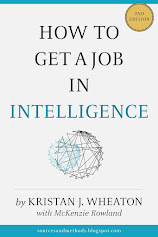DNI Michael McConnell testified in front of the Senate Select Committee On Intelligence on 5 FEB 08. The full transcript of the report can be downloaded here. The full text is worth the read but in case you don't have time, I have excerpted some of the highlights here (Three notes of interest: The full text is 47 pages long so I left out a ton of good stuff (plus some of the stuff that everyone already knows like al-Qaeda still wants to attack the US) from the summary below. Second, the level of agreement and disagreement on a number of issues in this document with the Davos "NIE" (discussed here) makes for a fascinating comparative analysis exercise. Third, the boldface, comment and hyperlinks are mine):
On Al-Qaeda and Terrorism:
- "Increased security measures at home and abroad have caused al-Qa’ida to view the West, especially the US, as a harder target, we have seen an influx of new Western recruits into the tribal areas [of Pakistan] since mid-2006."
- "We assess that al-Qa’ida’s Homeland plotting is likely to continue to focus on prominent political, economic, and infrastructure targets designed to produce mass casualties, visually dramatic destruction, significant economic aftershocks, and/or fear among the population."
- "I will discuss the success we are having against al-Qa’ida in Iraq (AQI) as part of the larger discussion of the Intelligence Community’s analysis of the Iraq situation, but here I would like to highlight that AQI remains al-Qa’ida’s most visible and capable affiliate. I am increasingly concerned that as we inflict significant damage on al-Qa’ida in Iraq, it may shift resources to mounting more attacks outside of Iraq."
- "It probably will continue to devote some effort towards honoring Bin Ladin’s request in 2005 that AQI attempt to strike the United States, affirmed publicly by current AQI leader Abu Ayyub al-Masri in a November 2006 threat against the White House."
- "AQI tactics, tradecraft, and techniques are transmitted on the Internet, but AQI documents captured in Iraq suggest that fewer than 100 AQI terrorists have moved from Iraq to establish cells in other countries."
- "We judge al-Qa’ida will continue to attempt attacks in the Arabian Peninsula, particularly in Saudi Arabia, Yemen, United Arab Emirates, and Bahrain."
- "The Intelligence Community (IC) assesses al-Qa’ida associated groups and networks in Lebanon pose a growing threat to Western interests in the Levant. In East Africa, the Ethiopian invasion of Somalia disrupted al-Qa’ida in East Africa (AQEA) operations and activities, but senior AQEA operatives responsible for the 1998 US Embassy bombings and the 2002 attacks in Mombassa, Kenya, remain at large. The IC assesses Jemaah Islamiya (JI) in Indonesia and the Abu Sayyaf Group (ASG) in the Philippines—which have historic links to al-Qa’ida and have killed over 400 people—are the two terrorist groups posing the greatest threat to US interests in Southeast Asia. The IC assesses that Pakistan-based Lashkar-e-Tayyiba (LT) and other Kashmir-focused groups will continue attack planning and execution in India."
- "The brutal attacks against Muslim civilians unleashed by AQI and AQIM and the conflicting demands of the various extremist agendas are tarnishing al-Qa’ida’s self-styled image as the extremist vanguard."
- "The spread of radical Salafi Internet sites that provide religious justification for attacks, increasingly aggressive and violent anti-Western rhetoric and actions by local groups, and the growing number of radical, self-generating cells in Western countries that identify with violent Salafi objectives, all suggest growth of a radical and violent segment among the West’s Muslim populations. Our European allies regularly tell us that they are uncovering new extremist networks in their countries."
- "While the threat from such homegrown extremists is greater in Europe, the US is not immune. The threat here is likely to be fueled in part by propaganda and mischaracterizations of US foreign policy as harmful to Muslims, rather than by any formal assistance from al-Qa’ida or other recognized groups."
- "A small, but growing portion of al-Qa’ida propaganda, is in English and is distributed to an American audience—either in translated form or directly by English-speaking al-Qa’ida members like Adam Gadahn, the American member of al-Qa’ida who, in early-January, publicly urged Muslims to use violence to protest the President’s Middle East trip."
- "To date, cells detected in the United States have lacked the level of sophistication, experience, and access to resources of terrorist cells overseas. Their efforts, when disrupted, largely have been in the nascent phase, and authorities often were able to take advantage of poor operational tradecraft."
On Iran's Nuclear Ambitions: The section on Iran was largely about Iran's nuclear program and the words used to describe it were identical to the
Iran National Intelligence Estimate (NIE). It is interesting to note the type of language that was used by McConnell to deliver the testimony. It followed essentially the same rules as pre-Iran NIEs with the exception of this section on Iran's nuclear ambitions. Assessments of analytic confidence were notably lacking from all the other sections of the testimony except for this section. It gave me the sense that many of the assessments in the testimony had been essentially cut and pasted from NIEs that have not been made public. For more on the way in which the Iran NIE was constructed and how that differs from previous NIEs, see
this series of blog posts)
On North Korea:- "Pyongyang probably views its [nuclear] capabilities as being more for deterrence and coercive diplomacy than for warfighting and would consider using nuclear weapons only under certain narrow circumstances."
- "The regime appears stable, but persistent economic privation and natural disasters—such as the severe floods last August—and uncertainty about succession arrangements create the potential for domestic unrest with unpredictable consequences."
On Pakistan and India:- "Although both New Delhi and Islamabad are fielding a more mature strategic nuclear capability, they do not appear to be engaged in a Cold War-style arms race for numerical superiority."
On the Safety Of Pakistan's Nukes:- "We judge the ongoing political uncertainty in Pakistan has not seriously threatened the military’s control of the nuclear arsenal, but vulnerabilities exist."
On US Cyber Security:- "The US information infrastructure—including telecommunications and computer networks and systems, and the data that reside on them—is critical to virtually every aspect of modern life. Therefore, threats to our IT infrastructure are an important focus of the Intelligence Community."
- "Over the past year, cyber exploitation activity has grown more sophisticated, more targeted, and more serious. The Intelligence Community expects these trends to continue in the coming year."
- "We assess that nations, including Russia and China, have the technical capabilities to target and disrupt elements of the US information infrastructure and for intelligence collection. Nation states and criminals target our government and private sector information networks to gain competitive advantage in the commercial sector. Terrorist groups—including al-Qa’ida, HAMAS, and Hizballah—have expressed the desire to use cyber means to target the United States. Criminal elements continue to show growing sophistication in technical capability and targeting, and today operate a pervasive, mature on-line service economy in illicit cyber capabilities and services available to anyone willing to pay."
On Afghanistan:- "Although international forces and the Afghan National Army continue to score tactical victories over the Taliban, the security situation has deteriorated in some areas in the south, and Taliban forces have expanded their operations into previously peaceful areas of the west and around Kabul."
- "The death or capture of three top Taliban leaders last year—their first high level losses—does not yet appear to have significantly disrupted insurgent operation."
- "Despite improved eradication and investigative efforts, poppy cultivation increased again last year. Opium poppy cultivation remains at or near 2004 record levels with over 200,000 hectares of land under cultivation in 2007."
- "Drug money is an important source of income, especially at the local level where some Taliban commanders accrue their own operational funding."
On Iraq:- "The security situation in Iraq continues to show signs of improvement."
- "We judge these security gains are the result of a combination of factors, including the success of tribal efforts in combating AQI, expanded Coalition operations, and the growing capabilities of the Iraqi Security Forces (ISF)."
- "Security in southern Iraq probably will remain fragile in the coming months as rival Shia groups continue to compete violently for political power and economic resources."
- "Iran––primarily through the Islamic Revolutionary Guard Corps-Qods Force––continues to provide weapons, funding, and training support to certain Iraqi Shia militants despite reported commitments by senior Iranian officials to stop such support. "
- "Approximately 90 percent of all suicide attacks in Iraq are conducted by foreign terrorists with 50 to 80 foreign terrorists entering Iraq each month, although that number appeared to decline in the last part of 2007. Seventy to eighty percent of the foreign terrorists gain final entry into Iraq through Syria, many through the Damascus international airport."
On Iran:- "During the next year Supreme Leader Ali Khamenei and Iran’s various conservative factions, despite some differences and infighting, are expected to maintain control over a politically stable if economically troubled Iranian state."
- "Iranian leadership perceptions of a favorable environment are driving its foreign policy to expand Tehran’s influence and leadership in the region and the Islamic world and to undermine US influence, which it perceives as inimical to Iran’s clerical regime. To achieve its regional aims and mitigate threats, Iran seeks to develop a sphere of influence based on diplomatic and economic relations, religious affinities, and shared anti-US sentiments."
- "In Afghanistan, Iran likely will continue to focus on political activities, reaching out to alternative power centers, and challenging the US-led Coalition. Iranian officials probably will increase contact with various militias, political oppositionists, and religious leaders in Afghanistan and continue to provide lethal aid to groups and individuals who might be able to influence events in Iran’s favor should the Karzai government falter or turn against Iran. We assess Iran has provided weapons to some Taliban commanders."
On Prospects For Peace in Palestine:- "Despite progress toward initiating formal peace talks made in Annapolis last November, concern persists over the Palestinian Authority’s ability to deliver the security demanded by Israel and to win popular support for its positions."
In Saudi Arabia:- "In Saudi Arabia, the long-term challenge from Islamic extremism has been checked for now, and the government benefits from steady, oil price-driven economic growth."
In Russia:- "We judge the Russian economy will continue to expand under a new leadership, although at a slower rate than over the last eight years, given capacity constraints, the slow pace of institutional change, the impact of real ruble appreciation, and developments in the international economy."
- "Other elements of Russian national power—from trade and energy, to diplomatic instruments and military and intelligence capabilities—are on a path to grow over the next four years."
In Kosovo and Bosnia:- "Inter-ethnic violence that brings about intervention by NATO-led forces, is possible once Kosovo declares its independence, and any violence could spill over to neighboring states."
- "We judge the probability of inter ethnic violence is low absent a move by Bosnia’s Serb entity, the Republika Srpska, toward secession. Any violence would put pressure on US and NATO forces in the region to assist."
In China: - "As a result, China’s global engagement is not driven by Communist ideology or military expansionism, but instead by a need for access to markets, resources, technology and expertise, and a desire to assert its role in the international community."
- "Indeed, Chinese officials consistently emphasize the need to seek cooperative relations with Washington, because conflict with the United States would risk derailing China’s economic development. They also seek to alleviate international concerns about China’s strategic intentions. As China’s influence grows, however, Beijing probably will increasingly expect its interests to be respected by other countries."
- "Notwithstanding China’s external goals, the leadership is focused on threats to domestic stability."
- "China’s impressive economic growth—it is the world’s second largest economy—masks significant distortions and risks, including a rigidly controlled currency that contributes to excess liquidity, wasteful investment; government policies that favor exports over domestic consumption; and a state-run banking system slowly recovering from a series of credit problems. China’s demographic problem of an aging population, high incidence of chronic and infectious disease, environmental degradation, and an increasing energy crunch are likely to slow economic growth over the long term. A sudden and sharp slowdown in China could exacerbate vulnerabilities in the global economy; hardest hit would be its neighbors who sell about 50 percent of their goods to China and commodity producers who have enjoyed high prices and expanding export volumes because of China’s rising demand for raw material, metals, and food." (Comment: My students have done a number of analytic projects on China. They have looked at short and long term implications, regional and national issues and even at very focused industry level studies. In every case, they wind up highlighting these exact same issues and in many of these analyses, they indicate that the period after the 2008 Olympics is the watershed. Obviously neither I nor my students are Chinese experts but it occurs to me that we ought to be giving a bit more attention not to the coming domination of the world by China but to forecasting and mitigating its possible collapse.)
In Latin America:- "Inspired and supported by Venezuela and Cuba, leaders in Bolivia, Nicaragua, and—more tentatively—in Ecuador are pursuing agendas that undercut checks and balances on presidential power, seek lengthy presidential terms, weaken media and civil liberties, and emphasize economic nationalism at the expense of market-based approaches. Moreover, each of these governments, to varying degrees, has engaged in sharply anti-US rhetoric, aligned with Venezuela and Cuba—and increasingly Iran—on international issues, and advocated measures that directly clash with US initiatives."
In Venezuela:- "We judge Chavez miscalculated public opposition to such moves as seeking indefinite re-election and greater discretionary authority over expropriating private property."
In Cuba:- "We judge Raul’s most likely approach will be cautious, incremental steps to make the agricultural sector more productive, to allow some private sector expansion through the creation of more small-scale enterprises, and to attract new foreign investment. If Raul moves forward, he probably will take pains to ensure elite consensus. Senior Cuban officials have made clear that there are no plans to permit competitive elections or otherwise alter the Communist Party’s monopoly of power. Indeed, the determination of the Cuban leadership to ignore outside pressure to carry out significant economic and political reform continues to be reinforced by the more than $1 billion net annual subsidy that Venezuela provides to sustain Cuba."
In Mexico:- "The overall picture in Mexico is positive. President Felipe Calderon’s strong start in his first year in office featured an aggressive counternarcotics offensive, forging a working relationship with elements of the opposition, securing a limited revamping of the government pension system, and pushing through Congress a high-priority fiscal reform package. The public has supported most of Calderon’s policies, and sustaining this momentum will be an important task as the midterm election season approaches in 2009."
In Nigeria And Africa:- "Persistent insecurity in Nigeria’s oil producing region, the Niger Delta, poses a direct threat to US strategic interests in sub-Saharan Africa. Ongoing instability and conflict in other parts of Africa pose less direct though still significant threats to US interests because of their high humanitarian and peacekeeping costs, drag on democratic and economic development, and potential to get worse."
In Kenya:
- "Kibaki probably will do everything he can to hold on to power. Kenya is likely to enter a period of increased social tension and instability, which could affect its willingness and ability to cooperate with the US on regional diplomatic and counterterrorist matters."
In Mali and Niger:- "Fledgling insurgencies among nomads in Mali and Niger are likely to remain confined to the remote and sparsely populated Sahara desert but nonetheless are a strain on the security forces of these two impoverished democracies."
In Zimbabwe:- "Serious threats to Zimbabwean President Mugabe have yet to materialize despite hyperinflation, economic decline, and political uncertainty."
On Oil Prices:- "Despite a slowdown in the global economy, robust demand from major developing country consumers has not eased and other dynamics feeding high prices appear likely to endure."
On Global Food Prices:- "Global food prices also have been rising steadily over the past two years driven by higher energy prices—which push up input costs—weak harvests, historically low stocks, and robust demand. Wheat prices were up over 60 percent in 2007, and are at a 20-year high. Other foodstuffs such as vegetable oils also are near records. There is little near term relief in sight because production increases in several countries, including Australia, are hampered by water shortages and land constraints."
On Bioterror And Pandemics:- "While we do not currently see this level of technical sophistication in terrorist groups—isolating a virulent strain is difficult—the possibility cannot be ruled out; therefore, we will continue to use our intelligence resources to try to help detect any such preparations to use a virus as a terrorist weapon."




